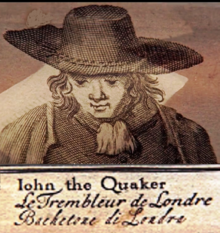John Perrot (Quaker)
John Perrot | |
|---|---|
 | |
| Died | 1665-1671 |
| Spouse | Elizabeth |
John Perrot (died 1665 or 1671)[1] was an Irish Quaker sectary known for his missionary work and writings.[2]
Biography
[edit]According to the Dictionary of Irish Biography "Perrot was probably born in Ireland. although some say his origin is unknown. He claimed he was an illegitimate son of Sir John Perrot, Lord Deputy of Ireland, but there is no evidence of this."[1]
Perrot was a Baptist before becoming a Quaker, living near Waterford with his wife Elizabeth and two children.
Before 1656, Perrot joined the Quakers and began preaching in Limerick. In 1657, he embarked on a mission to Italy with John Love, intending to convert the Pope. They travelled through Lyon, Leghorn, and Athens, where Perrot wrote various religious treatises and letters.
On arriving in Rome, probably in 1658, Perrot and Love commenced preaching against the Romish church, and were arrested. Love died under torture, while Perrot was sent to a madhouse, where he continued to write and send works to England. His imprisonment garnered sympathy, and efforts were made to secure his release, which was achieved in May 1661.
Upon his return to London, Perrot faced criticism from fellow Quakers, including George Fox, for his unconventional beliefs, particularly his opposition to the removal of hats during prayer. Despite losing many supporters, he continued to preach in England and Ireland. In 1662, Perrot and his followers emigrated to Barbados, where he served as a clerk to the magistrates.
Perrot later visited Virginia, influencing local Quakers to abandon traditional practices. He engaged in several trade and agricultural projects in Barbados, though none were successful. Perrot died in Jamaica before October 1671, leaving behind a significant body of written work.[2]
Work
[edit]His notable works include "A Word to the World answering the Darkness thereof", "Immanuel the Salvation of Israel", and "The Vision of John Perrot". Despite his contributions, his eccentric beliefs and behaviors ultimately led to his marginalization within the Quaker movement.[2]
External links
[edit]- John Perrot, early Quaker schismatic by Kenneth L. Carroll
- John Perrot, Quaker in The P*rr*tt Society
References
[edit]- ^ a b "Perrot, John". Dictionary of Irish Biography.
- ^ a b c Smith, Charlotte Fell (1896). . Dictionary of National Biography. Vol. 45. pp. 26–28.
